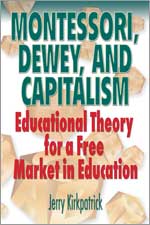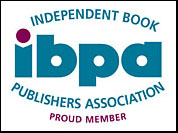Scholarly works in the Objectivist and Austrian Traditions
Reviews • Preface • Excerpt • Behind the Scenes
 Reviews and Comments
Reviews and Comments
Montessori, Dewey, and
Capitalism:
Educational Theory for a Free Market in
Education
by Jerry Kirkpatrick, Ph.D., Professor emeritus of International Business and Marketing, California State Polytechnic University, Pomona (Cal Poly Pomona)
Hardcover $42.95, Softcover $18.95, Ebook $1.99
Buy: Amazon, Barnes & Noble, IndieBound
Ebook: Kindle, Apple Books, B&N Nook, Kobo, or Smashwords
Hardcover for libraries: Ingram or Baker & Taylor
“. . . a provocative synthesis of the educational philosophies of Maria Montessori and John Dewey with the economic philosophies of Ayn Rand and Ludwig Von Mises. At the center of Kirkpatrick's thesis is his belief that public education be subject to a free-market model.
—Dennis Attick and Deron Boyles, Education & Culture, 26(1) 2010, 100-104. Read Review.
“Kirkpatrick’s book is one of the first to consider the methodological and instructional foundations of an educational free market, and the author does so in an original and engaging way. . . . [his] history of child-centered versus teacher-centered theories of education is highly instructive.”
—Terry Stoops, The Freeman, 59(9) November 2009. Read review.
“Refreshing to see . . . a book about educational theory as a whole and about the philosophical concepts on which it is based. Montessori, Dewey, and Capitalism is an attempt—and generally a successful one—to take the best tenets of progressive education and apply them to modern reality. . . . [Kirkpatrick] aims to articulate a theory of education that allows children to become free-thinking adults, not limited by adult repression, bureaucratic stagnation, or disengagement from thought (‘mental passivity’).”
—Jane S. Shaw, The Independent Review, 14(1) Summer 2009. Read review.
“Kirkpatrick's book is immensely valuable and stimulating in opening up new possibilities. . . . must reading for those interested in the philosophy of education and for anyone who cares about a free society.”
—David Gordon, Reason Papers, 30 (Fall 2008), 129-33. Read review.
“I think there is a lot to learn from this book, and Professor Kirkpatrick should be applauded for attempting to develop a philosophy of education consistent with the free market. . . . I found his discussion of the teaching and learning process and how authority and coercion can undermine learning (Chapter 4) to be both insightful and helpful to me as a classroom teacher.”
—Joshua Hall, Journal of School Choice, 2(3) 2008. Read review.
“Kirkpatrick's new book . . . is a shocking, no-holds-barred look at the current U.S. educational system. . . . [It] provides a detailed and just-as-shocking philosophy on what the system could potentially become in a free market environment. . . . an exceptionally intelligent read. . . . a profound look into the problems of the American public education system.”
—Vicki Landes, ReaderViews.com, September 2008. Read review.
“This work of Philosophy and Education creatively connects Montessori concepts of educational pedagogy with the works of John Dewey and the cultural economics of capitalism. The use of the ideas and philosophy of Ayn Rand are a refreshing perspective relative to education and culture in today's society. This is a new and creative means of understanding the synergy that exists between the three writers and the concepts of capitalism and education. It is an avant-garde perspective of educational freedom that is brilliant and forceful.”
—G. D. Albear, Assistant Professor of Education, Eastern Illinois University, August 8, 2008
“This is one of the most original, intriguing and provocative books on education I have come across in a long while. Jerry Kirkpatrick . . . has concocted an audacious blend of ideas that are rarely, if ever, considered together even though, as he demonstrates, they form a coherent whole. . . . I do think you should read this book. Wrestle with it yourself, and see where you come out.”
—Ron Miller, Education Revolution: The Magazine of Educational Alternatives, Summer 2008
“[E]xcellent theory of education. . . . I highly recommend this book as thought-provoking, original, and educational . . . . a vast amount of historical, philosophical, and psychological material [that] present[s] a truly original theory of learning. Montessori, Dewey, and Capitalism will educate you about the kind of education suitable to members of a free society—and educate you far beyond your expectations.”
—Marsha Enright, The New Individualist, April 2008. Read review.
Pre-Publication Comments
“This is a provocative and stimulating inquiry into the core beliefs that define our school system and inhibit the transformation it so desperately needs. By skillfully applying insights from three brilliant yet starkly different theorists—Montessori, Dewey, and Ayn Rand—Dr. Kirkpatrick offers a refreshingly original vision that will illuminate the efforts of anyone working for substantive change in education.”
—Ron Miller, Ph.D., author, Free Schools, Free People: Education and Democracy After the 1960s
“Jerry Kirkpatrick offers a revolutionary perspective on educational theory. It comes as no surprise that this gifted follower of Ayn Rand favors a free market in education over the compulsion of ‘social liberalism.’ Surprisingly, he argues that John Dewey can be enlisted as an ally in the battle for non-coercive schools. Like Maria Montessori, Dewey stressed the development of the child’s ability for concentrated attention, and his views fit better with the free market than with the Fabian socialism he himself favored. Kirkpatrick’s outstanding book is a major contribution.”
—David Gordon, Editor, The Mises Review
“As one who has experienced Stalinist as well as modern liberal education—the former in Hungary, the latter in Germany and the U.S.A.—and has himself been a teacher now for over 35 years, I have always been outraged at the similarity between the two supposedly diametrically opposed systems. More than in any other social realm, in education much of the West has followed more or less consistently, the principles of statism. Jerry Kirkpatrick’s book develops a thorough and accessible analysis of how the education of young people needs a fundamentally different approach. It needs to incorporate, among other features, the ideals of a free market society. He shows how only that kind of transformation will turn this institution into a decisively positive experience for all children and young adults. His discussions reach into many areas that surround education—political, economic, ethical, psychological, and legal. This book is clearly the most systematic, well organized discussion of its subject matter on the market today.”
—Tibor R. Machan, R. C. Hoiles Chair in Business Ethics and Free Enterprise, Chapman University,
editor, Education in a Free Society
“Professor Jerry Kirkpatrick’s Montessori, Dewey, and Capitalism is a significant and original book. Kirkpatrick shows that Maria Montessori and John Dewey—whose educational philosophies are often interpreted as being opposed—in fact agree on the most important fundamentals in education. Kirkpatrick also argues persuasively that, despite the fact that neither Montessori nor Dewey were advocates of free market capitalism, their liberal educational philosophy can best be realized only within a fully liberal polity. This historically- and philosophically-informed book will repay close reading.”
—Stephen R. C. Hicks, Professor of Philosophy, Rockford College
Executive Director of the Center for Ethics and Entrepreneurship,
author, Explaining Postmodernism: Skepticism and Socialism from Rousseau to Foucault
“Jerry Kirkpatrick's interesting new book on the philosophy of education effectively makes the case for uniting the views of John Dewey, Maria Montessori, and Ayn Rand. The author calls for an education that recognizes the freedom, creative power, and value of the individual human mind and that can foster the transition of dependent children into mature, independent adults who engage in productive careers as a main purpose in their lives. Kirkpatrick convincingly makes the case for the elimination of coercion in education and for a competitive marketplace of capitalistic educational businesses.”
—Edward W. Younkins, Professor of Accountancy and Business Administration
Wheeling Jesuit University, author, Capitalism and Commerce:
Conceptual Foundations of Free Enterprise


